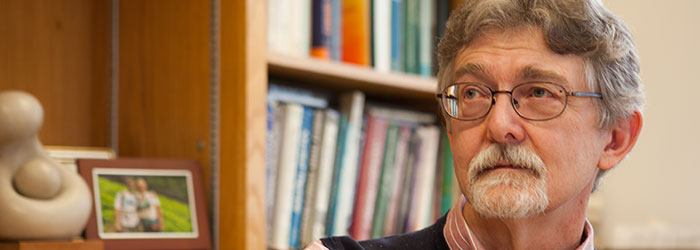By John DiConsiglio
For most Americans, there are few more frightening prospects than losing a job. Even with the economy seemingly on the rebound and unemployment rates dipping to five percent, most of us still dread the thought of a sudden lay-off, a long and fruitless job search and the helplessness of being unable to financially care for our families. No wonder we associate job loss with a bleak checklist of psychological conditions, from lowered self-esteem to anxiety and depression.
But there’s a flipside to the image of the despairing job seeker slogging to interviews, writing countless cover letters and enduring rejection after rejection. Some greet a pink slip with a shrug. They look on the bright side: No more overbearing boss, more time with the kids and a chance to find a more creative outlet for their talents.
Why does job loss lead one person to fall into a depressive state, and another to celebrate a new found sense of freedom?
That’s the question Professor of Psychology George W. Howe has asked himself in one form or another for 20 years. Through five studies and with nearly 3,000 participants, Howe has investigated the interplay between unemployment stress and the onset of depression. Backed by funding from the National Institute of Mental Health, Howe’s recent studies have isolated personality traits that may explain why some people are more susceptible to unemployment-related depression than others. His research could lead to innovative techniques for coping with job-loss depression and anxiety.
“Unemployment is a laboratory for stress,” he said. “There are some people who come through a job loss just fine, and others who are completely derailed by it. What if we could identify these people and target intervention programs for their specific needs? Think about the lives we could improve.”
A Cascade of Events
It’s hard to dispute an unemployment-depression link. A 2014 Gallup poll found that jobless Americans are more than twice as likely to say they have been treated for depression as those with full-time jobs. Anecdotally, most of us rank job loss alongside life’s most devastating traumas, like the death of a loved one or a catastrophic injury.
But, according to Howe, while unemployment-related depression is significant, its impact is “moderate” when compared to other traumatic incidents. And it’s far from universal. “It’s a stereotype to say, ‘Of course, everybody gets depressed when they are unemployed,’” he explained. “That’s actually not true. Unemployment varies substantially. People vary substantially. Not everyone is crushed when they lose their job.”
“The context of the unemployment,” as Howe put it, weighs heavily on a person’s mental health. A profound financial hit, the strength of the job market in a particular occupation or what Howe calls “a negative cascade of events”—like an undesired relocation or the disintegration of relationships—all can cause even the most resilient job-seeker to fall into despondency.
But beyond individual circumstances, Howe’s work revealed that there are specific personality dimensions that can predict susceptibility to unemployment-related depression. People who are most affected by job loss share similar traits, including an overall sensitivity to stress, the lack of healthy social relationships or a close attachment to someone who can provide support, and a view of the world that is largely pessimistic.
“What are your beliefs about the way the world works?" Howe said. "Some think positively about themselves and the future. Others believe everything bad is their fault and there’s nothing they can do about it. Those two mindsets play a role in determining whether you are going to have a negative reaction to job-loss stress.”
Ultimately, Howe said, his personality-factor data could be translated into job counseling and preventive intervention support programs that help the unemployed combat anxiety, helplessness and depression. He is working in concert with intervention support groups including a groundbreaking University of Michigan effort called the JOBS Project. Howe applauded JOBS’s efforts for helping the unemployed maintain motivation in the face of job-search frustrations.
“They validate the dignity of each person who has lost a job,” he said. “There’s strong evidence of stigmatization of the unemployed—including by the unemployed themselves. [Programs like JOBS] tend to reinforce that you aren’t a bad person for losing your job.”
Most unemployment counseling programs, however, target a broad population. Howe’s goal is to embark on smaller scale studies that focus on his high-risk subjects. “We’re not sure if what works for the general population works as effectively for those who have at-risk personality factors,” he said. “That’s the next direction we’re following. We want to pinpoint how we can reach the most vulnerable people.”
In the course of his research, Howe has interviewed thousands of job-seekers and collected stockpiles of data. Widely acknowledged as one of the foremost experts in stress and job loss, his colleagues often seek out his insights and expertise. Among his next projects, he will be collaborating with Patricia Haynes, an assistant professor of psychiatry at the University of Arizona’s College of Medicine, to test the links between unemployment, sleep loss and weight gain. Their research will be funded by a $3.1 million grant from National Institute of Health.


